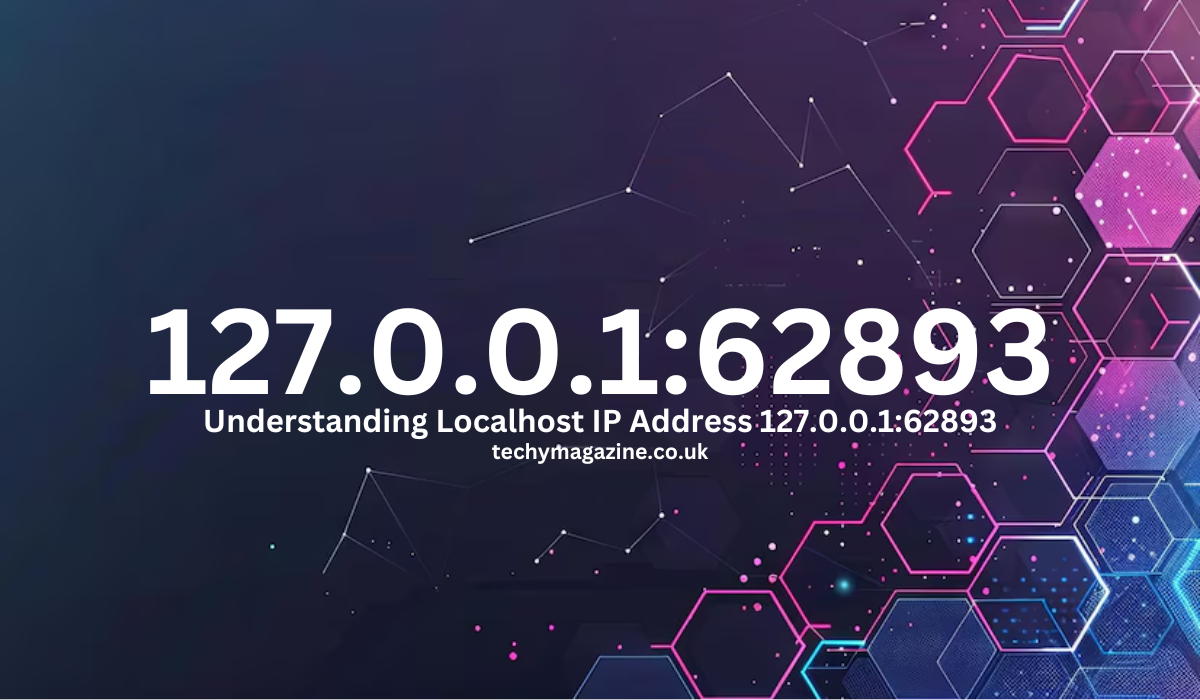Discover the significance of IP address 127.0.0.1:62893 in local network communication. This comprehensive guide explores its uses, configurations, and implications in development and testing environments.
Introduction
When exploring the intricate world of network communications, one must recognize the importance of the IP address 127.0.0.1. Commonly referred to as the local host, this address is integral to various computing tasks and pivotal in software development and network testing. Combining 127.0.0.1 with a port number like 62893 creates a unique reference point on the local machine, enabling precise and efficient communication between applications and services.
The local host, denoted by the IP address 127.0.0.1, serves as a gateway for internal communication within a computer. This address points to the machine’s network interface, allowing it to send and receive data as if communicating over a network without leaving the local system. Consequently, any port number associated with 127.0.0.1 becomes a channel through which specific services or applications can interact.
The Role of Port Numbers
Port numbers are fundamental in networking as they designate specific services and applications within the host machine. The port number 62893, when paired with 127.0.0.1, identifies a particular endpoint on the local machine. This designation allows for targeted communication, ensuring that data sent to this address reaches the intended service or application.
Understanding the function of port numbers is crucial for network configuration and troubleshooting. Each port serves a distinct purpose and can be assigned to various services, such as web servers, databases, or development tools. By specifying a port number like 62893, users and developers can streamline their interactions with specific services running on the local host.
Common Uses of 127.0.0.1:62893
The combination of 127.0.0.1 and port 62893 is frequently encountered in several scenarios. For instance, software developers often use localhost addresses to test applications before deploying them to a live environment. By running a service on 127.0.0.1:62893, developers can ensure that their applications function correctly without exposing them to external networks.
Additionally, the localhost address is invaluable for debugging purposes. When an application encounters issues, developers can utilize 127.0.0.1:62893 to isolate and test components in a controlled environment. This practice helps identify and resolve problems efficiently, thereby enhancing the application’s overall quality and performance.

Configuring Services on 127.0.0.1:62893
Configuring services to use 127.0.0.1:62893 involves setting up the relevant software to listen on this specific IP address and port number. For example, a web server or database management system can accept connections exclusively through this localhost address, ensuring that only local applications can interact with the service.
The configuration process typically involves modifying configuration files or settings within the software. By specifying 127.0.0.1 as the address and 62893 as the port, users can restrict access to the local machine, enhancing security and control over the service. This setup is instrumental in development environments where external access is unnecessary or undesirable.
Security Implications of Using 127.0.0.1:62893
While using 127.0.0.1:62893 offers several advantages, it also comes with security considerations. Since this address is only accessible from the local machine, it provides some protection against external threats. However, developers must ensure that the services running on this address are adequately secured to prevent unauthorized access within the local system.
Implementing robust security measures, such as firewalls and authentication protocols, is essential when configuring services on 127.0.0.1:62893. These measures help safeguard the services’ data and functionality, ensuring that they remain protected against potential threats.
Troubleshooting Issues with 127.0.0.1:62893
When dealing with 127.0.0.1:62893, users may encounter various issues, such as connectivity problems or configuration errors. Troubleshooting these issues involves systematically identifying and resolving the underlying problems. Common troubleshooting steps include checking the service status, verifying configuration settings, and ensuring that other applications are not using the port number.
Diagnostic tools and logs can provide valuable insights into the nature of the issues. By analyzing the data collected during the troubleshooting process, users can pinpoint the root cause of the problems and implement appropriate solutions to restore functionality.
Best Practices for Using 127.0.0.1:62893
Adhere to best practices in configuration and management to optimize the use of 127.0.0.1:62893. These practices include regularly updating the software, monitoring performance metrics, and ensuring security measures are in place. Maintaining proper documentation and following standard procedures can also help streamline the management of services running on this localhost address.
By implementing these best practices, users can enhance the reliability and efficiency of their local network services. This proactive approach helps maintain a well-functioning and secure application development and testing environment.
Advanced Configurations for 127.0.0.1:62893
For advanced users, configuring 127.0.0.1:62893 can involve complex setups and integrations. This might include configuring multiple services to interact with each other on the same local host address, implementing load-balancing techniques, or setting up automated testing environments.
Advanced configurations require a deeper understanding of network principles and software capabilities. By leveraging these advanced techniques, users can achieve more sophisticated setups that cater to specific needs and scenarios.
Use Cases in Software Development
In software development, 127.0.0.1:62893 is often used for testing and development purposes. Developers can create isolated environments to test new features, debug issues, and validate changes without affecting live systems. This approach facilitates a controlled environment where modifications can be made and tested with minimal risk.
Furthermore, using the localhost address helps simulate real-world conditions, allowing developers to identify potential issues before deployment. This practice enhances the quality of the final product and reduces the likelihood of encountering problems in production environments.
The Impact of Localhost on Network Performance
Utilizing 127.0.0.1:62893 can impact network performance, particularly in scenarios where multiple services run concurrently. While localhost communication is typically fast and efficient, excessive use of ports and services can lead to resource contention and performance degradation.
Monitoring and managing network resources effectively can mitigate potential performance issues. By analysing resource utilisation and optimising configurations, users can ensure that their local network remains performant and responsive.
Comparing Localhost with Other Network Addresses
Comparing 127.0.0.1 with other network addresses, such as public IP addresses, highlights its unique role in local communication. Unlike public IP addresses, which facilitate communication over the internet, 127.0.0.1 is confined to the local machine. This distinction underscores the importance of localhost in development and testing contexts.
Understanding the differences between localhost and public addresses can help users make informed decisions about network configurations and security. By recognizing each type of address’s specific use cases and limitations, users can optimize their network setups.
Integrating 127.0.0.1:62893 with Development Tools
Integrating 127.0.0.1:62893 with various development tools can enhance productivity and streamline workflows. Tools such as integrated development environments (IDEs), debugging tools, and testing frameworks can be configured to interact with services running on this localhost address.
By leveraging these integrations, developers can create efficient and effective development environments. This setup enables seamless communication between tools and services, facilitating smoother development processes and improved outcomes.
Exploring Alternatives to 127.0.0.1:62893
While 127.0.0.1:62893 is a versatile address, exploring alternatives can provide additional flexibility and functionality. For instance, using different localhost addresses or port numbers can accommodate specific requirements or preferences.
Exploring alternatives involves evaluating different configurations and setups to determine the best fit for particular needs. Users can identify the most suitable solutions for their applications and services by considering various options.

Addressing Common Misconceptions
Several things need to be clarified regarding 127.0.0.1:62893 and localhost communication. For example, some users may assume that localhost is entirely secure and invulnerable to attacks. However, while localhost communication is limited to the local machine, it is still essential to implement security measures to protect against internal threats.
Addressing these misconceptions involves educating users about the true nature of local-host communication and emphasizing the importance of security practices. Users can make more informed decisions about their network configurations by providing accurate information and clarifying misunderstandings.
Future Developments in Localhost Technology
As technology evolves, so does the use of localhost addresses like 127.0.0.1:62893. Future developments may include advancements in network protocols, enhanced security features, and improved performance metrics. Staying informed about these developments can help users adapt to changes and leverage new capabilities effectively.
By keeping abreast of technological advancements, users can ensure that their localhost configurations remain up-to-date and aligned with current best practices. This proactive approach enables users to maximize the benefits of emerging technologies and stay ahead in their network management efforts.
Conclusion
The combination of 127.0.0.1 and port 62893 represents a fundamental aspect of local network communication. Understanding its role, configuration, and implications is crucial for effective software development and network management. By adhering to best practices, exploring advanced configurations, and staying informed about technological advancements, users can optimize their use of this localhost address and achieve successful project outcomes.





